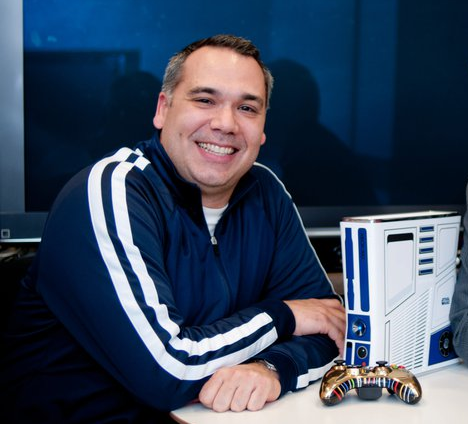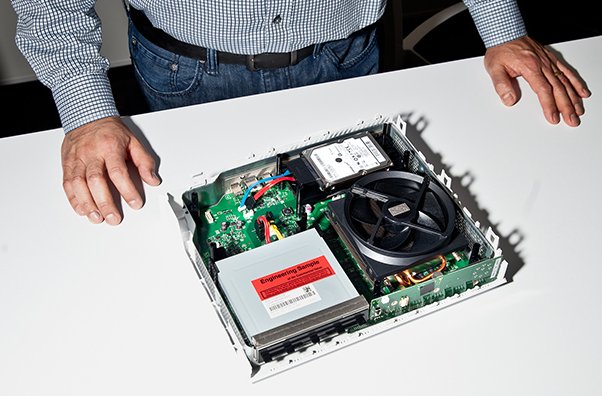
In the months since Microsoft rolled out (and subsequently reversed) its controversial digital licensing policies on the Xbox One, plenty of people have been asking themselves, "What were they thinking?" According to Microsoft Director of Product Planning Albert Penello, a lot of what they were thinking was simply along the lines of "Man, I hate getting up to change game discs."
"Absolutely true story, one of my favorite stories," Penello told Ars during a recent interview. "People want to know, 'Why did you do this? What was the impetus to go to an all-digital system?' And everybody remembers this scenario: when we did the original Kinect take-home... and we were testing for different homes, different lighting conditions, the beta take-home had all of the Kinect games available to be played off the hard drive. One of the number one pieces of feedback for the take-home—remember, we were testing facial recognition, voice recognition, lighting, gestures—the number one piece of feedback: 'Why can't all my games be played off my hard drive like this?'"
"It really sat with the team," Penello continued. "Once we were able to actually just launch from game to game to game without having to get up and put in a disc—do it right from sitting down at your couch—we were like, 'Holy crap, putting in discs sucks.' No one ever believes me when I tell this story, but that was absolutely the genesis of the whole thing—how can we have a system now where I have my whole game library just sitting on the console, so I [can] switch between games as easy as I switch between apps on my phone."
“Certainly our messaging was horrible”
Looking back on it now, Penello says he's "glad we made the change" to allow discs on the Xbox One to work like they always have. But he also expressed some regret over how Microsoft initially sold its all-digital vision to the public. "Certainly our messaging was horrible," he admitted. "One of the things I think happened is it's something that leaked and people had had time to think about all the worst-case scenarios, so by the time we actually confirmed it... all the rumors about it had been leaking out, and people had gone and gotten themselves into a frenzy about it. When we announced it, people didn't hear everything; they just heard the confirmation of the things that they were worried about."
In Penello's mind, Microsoft was simply trying to go where the industry is inevitably headed. "The truth is, anybody that's in this industry knows we're moving digital. It's already happened with music, it's happening with movies, your cell phone, your slate. PC gaming is completely digital. So I think our premise was 'Let's go digital, why not?'
"There's all these cool things we can do: your games can follow you everywhere, family-sharing types of programs, trying to bring some of the console-type benefits to digital that didn't exist, and people were like, 'Oh, we're not ready, too soon.' So I'm glad we made the change, and again, it's interesting watching people come back, now that we've made the change, go, 'Well actually I kind of like some of the things you guys were talking about.'"
While Penello granted that gamers weren't ready for a "totally different model" for their disc-based games, he noted that they are fine with similar models in other contexts. "If you are used to the Windows model, that Windows disc is exactly that model—it's just a bit delivery system—but people aren't used to that for games. That's one of the things where I think we said, 'You know what, we were a little farther ahead of this change than our customers were. I'm glad we made the change. I don't regret it at all—it was totally the right call."
Penello reaffirmed his belief that Microsoft would eventually arrive at some sort of hybrid model, where digital consumers get the benefits (and restrictions) Microsoft initially laid out while disc-based games are used the manner they always have. The main thing preventing such a model from being put into place for the system's launch, he said, is that Microsoft is too focused on moving the system from the purely digital model it had in place initially.
"Unfortunately, the net effect of the change is we had to go back and redo a lot of work that we weren't anticipating at this point in the program," he said. "It's actually extremely difficult [to change]. It's a totally different purchase flow, it's a totally different UI. We have to think about security differently, permitting the customers when they can be offline and have to be online—it's actually pretty complex. It's not just communicating to the customers but making sure they understand what games they own digitally versus physically and what rights they have. We didn't have to think about those two modes before. It was all just going to be one mode; everything you owned worked one way. Now we have to think about two ways of ownership."
"So the reason we're not doing anything right now [with the hybrid model] is that we gotta launch," he continued. "Everyone is focused on shipping this year... when we get our heads up from trying to ship the box, we'll go back and rethink [how] this hybrid model is really going to work."
Regaining trust and taking criticism

To some extent, Penello says, he understands when some people say they don't completely trust Microsoft following its reversal on Xbox One licensing. "I think over the last couple of years, we were focused on those new customers coming in, and I think we lost touch a little bit with the core gamers," he said. "My joke internally is our relationship with the core gamer is like your best friend whose phone calls you didn't return until you asked him for $500.' I think it's fair feedback. I think it was a wake-up call for the team."
At the same time, though, he admitted to some frustration that customers haven't given the company more credit for actually listening and changing things for the better. "I'm more surprised that [feelings of mistrust are] lingering now than that they lingered [after the announcement]," he said. "We had seen that people had been concerned about when it was rumored to be happening, so I sort of wasn't surprised [when it was announced]. But then when I changed back, we were like, 'Hey, we did it, we listened, we're with you,' and now everything we say gets criticized."
Penello also expressed frustration at the way Microsoft was getting treated by the press and observers when compared to a certain unnamed competitor. "I do feel like there's more scrutiny on what we do than on what our competitors are doing," he said. "We have been more transparent, and through that transparency you get to see the sausage getting made. You get to see the warts. Things that the other guys are getting away with is mind-boggling to me."
When pressed, he brought up one example from the coverage of Sony and the PlayStation 4 that he found particularly galling. "I only give this as an example because if this was us it would be the biggest news on the planet: no one has seen their box. No one has actually seen the insides of that box, no one has seen a piece of code running on their box. [Dev kits] are not the retail unit. The form factor they've shown—we showed the inside of our box, the inside of our unit back at E3. Everything you're seeing here is running off production code, except for the games that are still running on PC.
"I still haven't seen anything running on that actual [PS4] box," he continued. "It could be meaningless, I'm not condemning them to anything, but you've got a dev kit that's this big and a form factor that's this big, and I would like to see that running in that box. If we were doing the same thing... when we had that little thing at E3 where [a game] was running on a PC, even though we had said some games would be running on PCs, it was a huge conflict—[people said] we're having connection problems, we're having development problems. Now I'm showing everything running on a real shipping unit, and if the roles were reversed it'd be the biggest [issue]: 'We're all screwed, everything's terrible.'"
Kinect is “as fundamental... as the controller”
To anyone hoping that Microsoft might eventually relent on the Xbox One's Kinect integration and offer a lower-priced box without the 3D camera included, Penello said that while there were no such plans, "nothing's impossible." That said, he suggested that the Kinect was such an integral part of the system that selling it without the camera would be silly.
"Kinect is part of the Xbox One," he said. "It is part of the experience that we're building. It's as fundamental to the platform as the controller is in many ways. It sounds like I'm making up an excuse, but I think someone [could say], 'What if I shipped Xbox One without a controller, because you would prefer a different controller than the one I'm shipping?'
"It sounds like a silly analogy, but it's totally true. There are things you can do only with Kinect plugged in. There are features that are only enabled with that plugged in... We're building everything around Kinect. We're enabling you to not use Kinect, but the experience we're building, everything is built around Kinect."
Part of the problem in justifying the packed-in Kinect 2.0, Penello said, is that consumers are still in the mindset of the old Xbox 360 Kinect. "People think of Kinect on Xbox One the way they think of Kinect on Xbox 360: a motion gaming accessory," he said. "It is not a motion gaming accessory on Xbox One. It is a fundamental part of the platform.
"One of the things we're wrestling with is how many people haven't experienced it," he continued. "One of the challenges we face with an experience that requires you to interact with it is that I can tell you how awesome it's going to be, [but it] doesn't mean anything until you actually get to see it and decide for yourself... I think when it launches and people start using it, I will either be validated or invalidated.
"When we plugged online in in every console [on the original Xbox] and we said online was a core part of every box, people said, 'But I don't go online—why would I want to be online?' I have been through this sort of thing with people before, and all I can say is that we think about it as a fundamental part of the platform."
reader comments
347